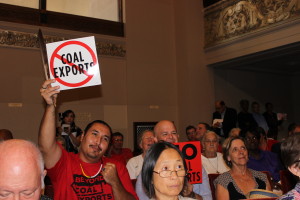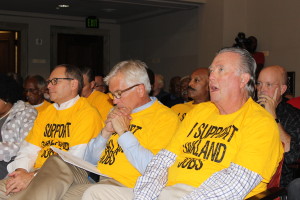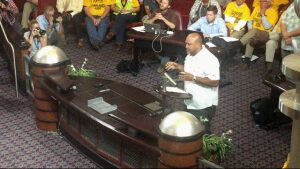Oakland’s Coal Train Dispute Pits Public Health vs. Local Jobs
Sep 26, 2015
By Tulio Ospina
Hundreds of community members attended Oakland City Council’s public hearing Monday on the health and safety impacts that exporting coal through the former Oakland Army Base could have on residents in West Oakland and surrounding areas.
Opponents of coal, backed by expert witnesses, are calling on the City Council to act on a “health and safety” section in the contract between the city and Army Base developer Phil Tagami that would allow the city to halt shipments of a commodity on its property if those shipments would place workers and surrounding communities “in a condition substantially dangerous to their health and safety.”
Monday’s public hearing was the first step for the City Council to make this determination, which could result in halting, regulating or placing a moratorium on shipping coal through the bulk commodities terminal at the army base.

For over six hours, speakers presented reasons why the city should prohibit or allow coal to be shipped through the future Oakland Bulk and Oversized Terminal (OBOT).
The coal discussion quickly polarized into a debate between health, safety and environmental concerns for Oakland residents versus the creation of jobs.
However, a number of observers consider the dichotomy between jobs and public health to be misleading because it is unclear whether shipping coal through the bulk terminal would create any more jobs for Oakland residents than any other commodity—such as wheat or potash—that might pass through the terminal.
At the end of the six-hour long hearing, some of the councilmembers weighed in on the issue with thoughts and questions they felt still needed to be answered.

And those who support the coal shipments wore yellow.
At the end of the six-hour long hearing, some of the councilmembers weighed in on the issue with thoughts and questions they felt still needed to be answered.
“There’s no reason to think that if we’re shipping wheat or something else (through the terminal) that there would be any less jobs than coal,” said Councilmember Rebecca Kaplan at the end of the hearing. “In fact, there are many products that would generate more jobs than coal.”
Councilmember Desley Brooks questioned the health evidence that opponents of a coal deal were presenting, saying she believes the health experts lack convincing evidence that coal dust and emissions are detrimental to people’s health and the environment.

Her principal concern seemed to be focused on job creation.
“We need to understand the effects of other issues such as poverty on the health impacts and ask ourselves does it outweigh coal,” said Brooks. “I can’t tell people who cannot feed their children that, yet again, they ought to wait for their next job opportunity.”
Pastor Gerald Agee of the Friendship Christian Center said, “The folks who come to our churches that are unable to find jobs and are being pushed out of their places because landlords want more money with rent.”
Agee says public health and safety are his primary concerns. He said his support for coal shipments is contingent on the city’s ability to create a binding contract with the developers to ensure there would be consequences if the operators of the terminal fall short on their health and safety promises.
Meanwhile, members of the International Longshore and Warehouse Union (ILWU) Local 10 and Local 34, who stand to gain most of the jobs at the terminal, have rejected the plan to export coal through the bulk terminal.
Longshore workers are opposed to “locking Oakland into a decades-long lease with a coal industry that many say is dying,” according to an ILWU press release.
Jasmin Ansar, a professor of economics at Mills College, told the council that coal is a questionable economic investment, saying the Port of Los Angeles lost money on coal shipment.
“The coal industry is in economic decline, and demand has decreased sharply due to cheaper alternatives such as oil, gas and renewables.”
“It would be a poor investment choice to tie up investment funds in a project that is unlikely to succeed and will likely leave Oakland to become stranded,” said Ansar.
“Coal isn’t going to be making jobs here for people in the community. These are ILWU jobs,” said Brian Beveridge, Co-Director for the West Oakland Environmental Indicators Project (WOEIP).
According to Beveridge, not only is it a myth that coal would generate more jobs than any other commodity but there would be “little to no chance that the unemployed and those not in a union would get whatever jobs the terminal would create.”
Beveridge said that he and Margaret Gordon of WOEIP had lunch with the developers of the coal terminal, Jerry Bridges and Omar Benjamin, who offered them 12 cents for every ton shipped through the terminal, which could amount to between six and eight million tons a year.
The developer told them that WOEIP could use the money any way it wants, including opening a health clinic, according to Beveridge, but he and Gordon turned down the offer.
The City Council concluded on Monday that it will keep the public hearing open until Oct. 5, to allow city staff to evaluate the evidence and present options for consideration to City Council by no later than Dec. 8.
The Post asked the City Attorney’s office to clarify whether a simple majority or a super major of seven out of eight councilmember would be needed to declare the shipment of coal to be a “health and safety” hazard under the development agreement. The City Attorney did not reply to the the Post’s question.
City Attorney Barbara Parker’s general position is that, though she is an elected official, she only provides her legal opinion in closed session with the City Council.